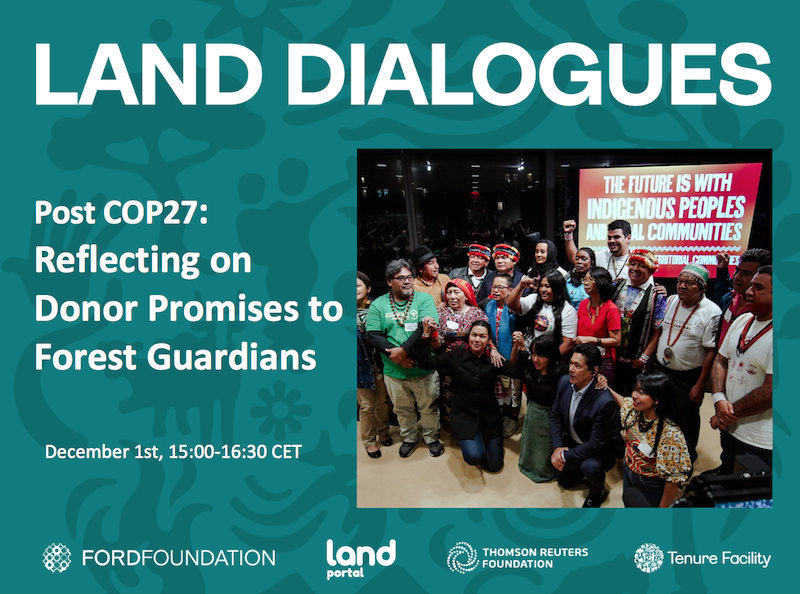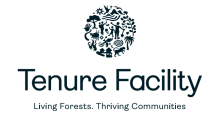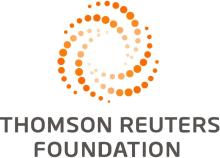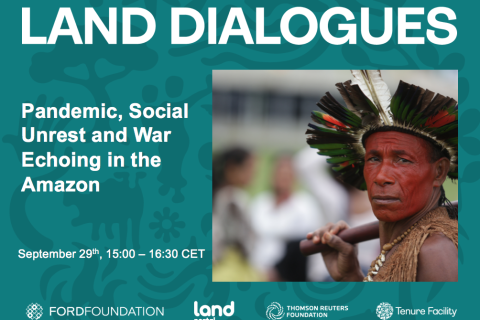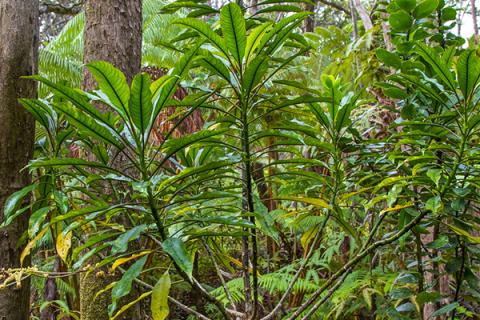December 1st 15:00-16:30 CET (9:00-10:30 EST)
Last year’s COP26 saw unprecedented engagement of Indigenous peoples and local communities, bringing focus to the ancestral land rights struggle and highlighting the role of the guardians of the world's forests. Yet as policymakers and politicians' time in Sharm el-Sheikh for COP27 has come to an end, media reports have raised the concern that Indigenous Peoples voices have, once again, been overshadowed. Is this the case?
This upcoming Land Dialogue, organized by the Land Portal Foundation, the Tenure Facility, The Ford Foundation and Thomson Reuters Foundation, will put Indigenous Peoples and local communities back at the centre of conversations. We have invited five panellists who were present at COP27 to share their experience and insights. How has the latest COP contributed to the land rights movement?
This episode will explore the top-line conversations at COP27; for example the rush towards an energy transition as well as the increased risks this poses to Indigenous and local territories. The conversation will also consider the need for renewed & continued focus on funding to support community land rights, governance of territories, and ensuring that funding is fit for purpose.
In connection to this, the recently launched Indigenous Peoples and Local Communities Forest Tenure Pledge Annual Report 2021-2022 will be presented and discussed. Join us on December 1st!
Moderator
- Thin Lei Win: Thin Lei Win is an award-winning Rome-based multimedia journalist specialising in food and climate issues for various international news media. Her extensive global experience includes nearly 13 years working as an international correspondent for the Thomson Reuters Foundation, the non-profit arm of the Thomson Reuters media company, covering topics ranging from governance, resilience and climate to food insecurity and refugees and displacement. Born and raised in Myanmar, Thin has lived and worked in Singapore, Vietnam, Thailand, and most recently, Italy, and has reported from many parts of Asia, Africa and Europe.
Panelists
- Casey Box : Casey Box is the Director of Global Strategy at The Christensen Fund where he leads the global program of the foundation. He brings over a decade of experience with expertise in advocating for indigenous rights, participatory grantmaking, network building, and environmental issues. Casey previously served as the Executive Director of Land is Life, Indigenous-led, international coalition working to advance the self-determination and collective rights of Indigenous peoples.
- Juan Carlos Jintiach: Juan Carlos is the coordinator of international economic cooperation and autonomous indigenous development for COICA (Coordinator of Indigenous Organizations of the Amazon Basin). He is also the elected official representing the indigenous peoples of Latin America in the Convention on Biological Diversity, as well as a focal point in the indigenous people’s caucus within the UNFCCC and in the World Bank’s Forest.
- Toya Manchineri: Toya Manchineri is from the Manchineri people in Acre and has more than 20 years of experience working together with indigenous organizations and their involvement in public policies at the international and national level. Over the past years Toya has been involved in several national and international events on climate change, presenting the positioning of indigenous organizations for climate agreements and policies. Toya is coordinator for the Articulation of Indigenous People Of Brazil (APIB). He is currently a political articulator for COIAB and area coordinator for territory and natural resources at COICA.
- Cristina Cox: Cristina Coc, a Q'eqchi Mayan community leader in Southern Belize, founded and is presently Program Director of the Julian Cho Society (JCS), dedicated to the conservation of environments and rights of indigenous peoples of Southern Belize. She is also one of the key organizers and co‐spokesperson for the Maya Leadership Alliance.
- Jenny Lopez: Jenny Lopez is a Land Governance Advisor responsible for land tenure rights programming and policy work at the UK’s Foreign, Commonwealth and Development Office (FCDO). This includes support for country-level land reform programmes and strengthening land-based investment governance and practices. She has been supporting the UK’s current role as Chair of the donor working group to deliver progress on the COP26 IPLC Forest Tenure Pledge commitments. Jenny’s background includes work on sustainable supply chains and livelihoods development, with a focus on agricultural and forestry value chains.

